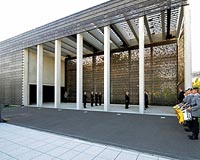| . |  |
. |
Algiers, Algeria (UPI) Sep 16, 2009 Russian forces recently killed a senior Algerian jihadist in the restive North Caucasus region of Dagestan, heightening concerns that al-Qaida's aggressive North African network is spearheading efforts to reignite the Islamist insurgency in Chechnya. The Federal Security Service, known by its Russian initials FSB, said the militant was known as "Dr. Mohammed" and identified him as "the al-Qaida coordinator in Dagestan." "Mohammed" was killed with another militant when Chechen security forces raided an insurgent safe house in Dagestan on Aug. 31. Officials said that "Mohammed" had first arrived in Russia from Algeria or France in 1999 and later joined an al-Qaida cell in Chechnya commanded by Daoud al-Khatab, a revered Saudi jihadist who was killed in 2002. "In 2007, Mohammed was sent to Dagestan with instructions to bring the local gangs under control, to ensure their funding from abroad and arrange for channels for militants to infiltrate into the republic," one official said. Russian security chiefs claim that al-Qaida has been striving to revive the insurgency in Chechnya that has twice erupted into full-blown wars since the early 1990s. In recent months, there has been a sharp increase in violence that once again threatens to challenge Russia's authority in the unruly region. This has included a series of suicide bombings, some carried out by Muslim women known as the "black widows." The president of neighboring Ingusheta, Yunus Bek-Yevkurov, was gravely wounded in a June suicide attack. Twenty-five policemen were killed in another in August. Moscow has become increasingly concerned at the growing involvement of foreign militants, many of them Arabs. Russia's deputy interior minister, Arkady Yedelev, claimed in January that such groups were operating in Dagestan and Chechnya. The following month Anatoly Safonov, the Russian presidential representative for international cooperation in fighting terrorism, warned that al-Qaida was rebuilding its strength in the North Caucasus. The Algeria-based al-Qaida in the Islamic Maghreb -- the Arabic name for North Africa, the western edge of the Muslim world -- appears to have been particularly active in this regard. "Al-Qaida has not traditionally been a natural ally for insurgents in the North Caucasus," Jane's Intelligence Weekly reported on Sept. 9. "Its ideology of global jihad has had little appeal to militants primarily motivated by local concerns such as government corruption, widespread poverty and indiscriminate security sweeps "Nevertheless, it is clear that after years of being marginalized, al-Qaida has become increasingly interested in re-engaging with the North Caucasus. "Not least, it hopes to be able to harness the growing insurgency in the region (especially in Dagestan and Ingushetia) and establish new safe havens for its wider operations," Jane's concluded. Apart from providing seasoned jihadists and planning operations, al-Qaida is also helping raise funds in the Gulf Arab states for the insurgency against Moscow, according to Arab diplomatic sources. AQIM emerged in September 2006 when Algeria's Salafist Group for Preaching and Combat, or GSPC, declared it had joined al-Qaida. The GSPC had broken away from the Armed Islamic Group, one of the most ferocious Islamist groups that fought the military-backed government through a civil war that raged in Algeria throughout the 1990s. In a May review of AQIM operations since the merger, the head of its political committee, Abu Abdullah Ahmad, listed one of the group's main achievements as taking its struggle out of the domestic context and into the international arena. This, he said in an audio interview distributed by the Islamist Al-Fajr Media Center, was the only approach for confronting "the alliance of the War on Islam." The concept of separating an internal enemy from an external enemy was "unfounded in Islam," Ahmad declared. AQIM has sought to unite the various jihadist groups across North Africa, and to expand their operations outside the region. Algerian militants have been conspicuous in the conflicts in Bosnia, Chechnya, Afghanistan and Iraq. "Some studies have even concluded that Algerians were the single largest group of foreign jihadists who fought in Iraq during the height of the insurgency there," according to the private Texas-based security consultancy Strategic Forecasting. Share This Article With Planet Earth
Related Links
 Germany inaugurates first memorial to fallen soldiers
Germany inaugurates first memorial to fallen soldiersBerlin (AFP) Sept 8, 2009 Germany on Tuesday inaugurated a new memorial to some 3,100 German soldiers killed in service since 1955, a move that breaks with its usual reticence over displays of military pride and comes amid heated debate about the country's role in Afghanistan. "We are aware that in the past the death of soldiers has often been used for propaganda, especially in Germany," said President Horst Koehler ... read more |
|
| The content herein, unless otherwise known to be public domain, are Copyright 1995-2009 - SpaceDaily. AFP and UPI Wire Stories are copyright Agence France-Presse and United Press International. ESA Portal Reports are copyright European Space Agency. All NASA sourced material is public domain. Additional copyrights may apply in whole or part to other bona fide parties. Advertising does not imply endorsement,agreement or approval of any opinions, statements or information provided by SpaceDaily on any Web page published or hosted by SpaceDaily. Privacy Statement |